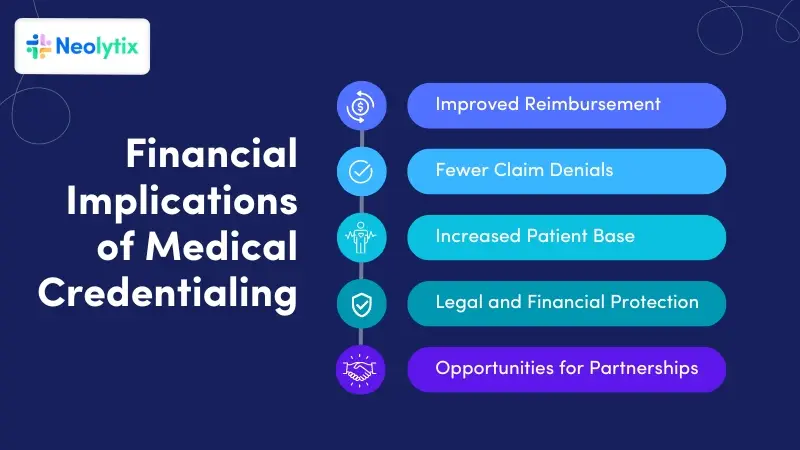Medical credentialing emerges as a foundational pillar in the healthcare ecosystem, ensuring that those entrusted with patient care possess the required qualifications, experience, and integrity. This rigorous process validates the credentials of healthcare practitioners, affirming their competence to deliver quality care.
However, the complexity and administrative intensity of the credentialing process pose significant challenges for healthcare organizations, often diverting resources away from patient care and towards bureaucratic navigation.
What Is Medical Credentialing?
Medical credentialing is the meticulous verification of a healthcare practitioner’s qualifications, including education, training, residency, and licensure, to ensure they meet the rigorous standards set by healthcare authorities and institutions.
This process involves primary source verification, where the authenticity of the practitioner’s credentials is verified directly from the original source, ensuring accuracy and reliability. The stakes in this detailed vetting process are incredibly high, as the credentials form the bedrock of trust between patients and healthcare providers.
It is this trust that underscores the non-negotiable nature of medical credentialing, as any compromise could potentially endanger patient safety and tarnish the healthcare organization’s reputation.
Who Benefits from Medical Credentialing?

The ripples of benefits from medical credentialing extend far beyond the administrative offices of healthcare organizations.
At the heart of this process are the medical professionals: doctors, nurses, and allied health practitioners, whose credentials are scrutinized to safeguard the quality of care. Healthcare organizations, armed with the assurance of having credentialed staff, stand as fortresses of trust in the eyes of their patients.
The patients themselves are the ultimate beneficiaries, receiving care from verified professionals who are recognized for their expertise and adherence to healthcare standards.
This collaborative ecosystem fosters an environment where medical excellence is the norm and patient safety is paramount, mitigating the risks of medical errors and enhancing overall healthcare quality.
What Are the Financial Implications of Medical Credentialing?
The importance of medical credentialing transcends administrative formalities, embedding itself as a critical component of the healthcare industry’s integrity. It is a barrier against incompetence, ensuring that only qualified professionals are at the helm of patient care.
The financial implications are equally significant, as accurate credentialing directly influences factors such as:
- Improved Reimbursement: Enables higher insurance reimbursements by ensuring provider eligibility.
- Fewer Claim Denials: Reduces claim rejections and administrative costs by maintaining up-to-date credentials.
- Increased Patient Base: Attracts more patients by aligning with multiple insurance networks.
- Legal and Financial Protection: Minimizes risks of lawsuits and fines by verifying staff qualifications.
- Opportunities for Partnerships: Boosts reputation and potential for profitable collaborations.

Fostering a Culture of Continuous Improvement
Credentialing, while often viewed through the lens of regulatory compliance and patient safety, has far-reaching implications that extend into the very fabric of healthcare delivery and organizational culture. It serves not only as a gatekeeper for quality but also as a catalyst for fostering a culture of continuous improvement among healthcare professionals and organizations.
1. Promoting Professional Development
Credentialing encourages healthcare practitioners to continually pursue professional development opportunities to meet the stringent standards required for credential renewal, thereby ensuring that their skills and knowledge remain at the forefront of medical advancements.
2. Enhancing Interdisciplinary Collaboration
The rigorous process of credentialing brings together various stakeholders within the healthcare ecosystem, promoting interdisciplinary collaboration. This synergy enhances the holistic approach to patient care, integrating diverse expertise for comprehensive treatment plans.
3. Benchmarking for Healthcare Excellence
The standards outlined in the credentialing process serve as benchmarks for healthcare excellence, guiding organizations in establishing and maintaining high-quality care protocols.
This benchmarking process drives healthcare facilities to constantly evaluate and improve their practices to align with industry best practices.
4. Building Public Confidence
Beyond the immediate circle of healthcare professionals and organizations, credentialing plays a pivotal role in building public confidence in the healthcare system. Knowing that healthcare providers are thoroughly vetted and credentialed reassures patients and their families about the quality and safety of the care they receive.
Furthermore, the trust engendered by thorough credentialing cannot be overstated. Patients place their lives in the hands of healthcare providers, relying on the system’s assurance that these professionals are credentialed and competent.
Real-world scenarios starkly illustrate the perils of inadequate credentialing. Instances where uncredentialed practitioners have caused harm, whether through medical errors or unethical practices, highlight the critical need for rigorous credentialing processes.
These cautionary tales serve as a call to action for healthcare organizations to prioritize and invest in comprehensive credentialing systems, safeguarding their patients and securing their practice’s reputation and financial health.
Understanding the Complex Credentialing Landscape
The credentialing landscape in healthcare is filled with complexities, varying significantly across different states and healthcare systems. Each jurisdiction has its unique set of regulations, standards, and processes, making credentialing a daunting task for healthcare organizations, especially those operating in multiple locations.
The challenge is compounded by the evolving nature of healthcare regulations, requiring organizations to stay abreast of changes to maintain compliance.
The Credentialing Timeline Credentialing Timeline:
Key Steps to Approval
- Start Application: Initiate the credentialing application with comprehensive documentation.
- Verification: Conduct thorough verification of qualifications, experience, and licenses from primary sources.
- Review & Processing: Applications and documents are reviewed for completeness and accuracy, undergoing processing by credentialing bodies.
- Approval: Credentialing approval is granted, allowing healthcare practitioners to be recognized by insurance networks and healthcare institutions.
Critical Considerations
- Time-Sensitive Process
Credentialing can take several months; any delays can disrupt billing and revenue.
- Timely Re-credentialing
Ensure credentials are regularly updated to maintain validity and compliance.
- Impact of Delays
Delays can affect financial stability and patient care quality. Delays in the credentialing process can have far-reaching consequences, affecting not only the financial bottom line but also the quality of patient care.
- Efficient Management
Neolytix ensures a smooth, timely process, preventing delays.
- Maintaining Trust
We safeguard revenue and uphold patient care standards through diligent timeline management.
Importance of Credentialing in Ensuring Quality
As we’ve seen, medical credentialing is a cornerstone of healthcare, pivotal in maintaining high standards of patient safety and quality care. The meticulous verification of healthcare professionals’ qualifications not only validates their competence but also ensures that only the most qualified individuals are entrusted with patient care.
In this context, let’s delve deeper into the multifaceted importance of credentialing.
Patient Safety and Quality Care
Credentialing plays a critical role in safeguarding patient safety and enhancing the quality of patient care provided.
- Ensuring Qualified Care: Credentialing verifies a healthcare provider’s qualifications, including education, training, and licensure. This rigorous process ensures that patients receive care from competent and skilled professionals.
- Impact on Patient Outcomes: Properly credentialed practitioners are better equipped to provide high-quality care, leading to improved patient outcomes and reduced incidences of medical errors.
By ensuring that only qualified professionals deliver care, credentialing mitigates the risk of medical errors and malpractice, directly impacting patient outcomes and safety.
Regulatory Compliance
Ensuring compliance with state and federal regulations is a critical component of healthcare operations. Credentialing plays a key role in aligning healthcare providers with these necessary standards, thereby protecting organizations from legal and financial risks.
State and Federal Regulations
Credentialing verifies that healthcare providers meet all state and federal standards. This alignment is essential for maintaining the legitimacy and operational integrity of the organization.
Imagine a healthcare provider who, without proper credentialing, falls short of the required standards. This oversight could lead to significant legal challenges and operational disruptions.
Avoiding Penalties:
Effective credentialing processes shield healthcare organizations from the severe consequences of non-compliance. By adhering to regulatory requirements, organizations can avoid costly legal and financial penalties.
For example, a hospital that fails to credential its staff properly might face hefty fines and a tarnished reputation, impacting both patient trust and financial stability.
Credentialing not only ensures regulatory compliance but also serves as a strategic measure to safeguard the organization’s legal and financial health.
Maintaining Healthcare Standards
Credentialing is indispensable in maintaining high standards within healthcare organizations. It fosters a culture of continuous professional development and excellence, ensuring all professionals deliver quality care.
- Upholding Standards: Credentialing maintains the integrity of healthcare practices by ensuring that all professionals adhere to high standards of care and ethical practices. This process is vital for delivering consistent, high-quality patient care.
- Continuous Professional Development: The requirement for regular updates and re-credentialing encourages healthcare providers to engage in ongoing education and training. This continuous learning ensures that their skills and knowledge remain current and relevant. Consider a physician who regularly updates their credentials and engages in professional development. This ongoing education enables them to stay abreast of the latest medical advancements, ultimately benefiting patient care.
Overall, credentialing is crucial for upholding healthcare standards, promoting continuous improvement, and enhancing the quality of patient care.
The Role of Credentialing in Risk Management
Credentialing is not just about compliance and standards; it also plays a vital role in risk management, significantly reducing legal risks and enhancing the organization’s reputation.
Reducing Legal Risks
Credentialing minimizes the risk of malpractice and negligence cases, ensuring that healthcare providers comply with legal standards and deliver safe, effective care.
Minimizing Malpractice Cases
By verifying the credentials of healthcare providers, organizations reduce the likelihood of malpractice, protecting both patients and the organization.
Ensuring Legal Compliance
Credentialing ensures that all healthcare providers meet the necessary legal standards, reducing the risk of legal disputes and penalties.
Effective credentialing is a powerful tool for mitigating legal risks and ensuring compliance with legal standards.
Enhancing Organizational Reputation
A robust credentialing process builds trust with patients and stakeholders, demonstrating a commitment to high standards and quality care.
- Building Trust: Thorough credentialing reassures patients and stakeholders that the healthcare organization prioritizes quality and safety, enhancing their confidence and trust.
- Commitment to Standards: By maintaining high credentialing standards, healthcare organizations showcase their dedication to excellence, reinforcing their reputation in the industry.
Credentialing enhances organizational reputation by building trust and demonstrating a steadfast commitment to high standards of care and safety.
Innovations in Credentialing
The credentialing landscape is evolving, with technological advances transforming the way credentialing is conducted. These innovations streamline processes, enhance accuracy, and improve overall efficiency.
Technological Advances
The adoption of software and automation in credentialing processes offers significant benefits, from reducing administrative burdens to improving data accuracy.
- Software and Automation: Modern credentialing systems utilize advanced software to automate the verification process, reducing the time and effort required for manual checks.
- Electronic Credentialing Systems: These systems offer secure, centralized platforms for storing and managing credentials, enhancing accessibility, and reducing the risk of errors.
Best Practices for Efficient Credentialing
Implementing best practices in credentialing can streamline processes, ensuring efficiency and compliance. Regular audits and updates are essential to maintaining an effective credentialing system.
- Streamlining Processes: Simplifying and standardizing credentialing procedures can improve efficiency, reducing the time and resources required.
- Regular Audits and Updates: Conducting regular coding audits and updates ensures that credentials remain current and compliant with evolving regulations and standards.
By adhering to these best practices, healthcare organizations can achieve a more streamlined, efficient, and compliant credentialing system, ultimately enhancing their operational effectiveness.
Future Trends in Credentialing
As the healthcare landscape continues to evolve, so too does the field of credentialing. Future trends include the integration of predictive analytics and artificial intelligence, as well as the establishment of global credentialing standards.
Predictive Analytics and AI
The use of predictive analytics and AI in credentialing promises to revolutionize the field, offering more accurate and efficient verification processes.
- Predictive Analytics: Utilizing data analytics can help predict potential issues and streamline the credentialing process, enhancing efficiency and accuracy.
- Artificial Intelligence: AI-driven systems can automate complex credentialing tasks, reducing administrative burdens and improving reliability.
These technological advancements, along with global credentialing standards, promise to revolutionize the credentialing process, making it more efficient, accurate, and reliable, ultimately supporting better healthcare outcomes.
Global Credentialing Standards
The future of credentialing lies in the development of global standards, ensuring consistency and quality across international borders. Establishing universal credentialing standards can facilitate the movement of healthcare professionals across countries, ensuring that they meet the same high standards of care.
Collaboration between countries can lead to the development of best practices and shared resources, improving credentialing processes worldwide.
By understanding and implementing these best practices and innovations, healthcare organizations can optimize their credentialing processes, ensuring quality care, compliance, and operational efficiency.
Build a Future of Excellence: Start Your Journey with Neolytix Now
The critical role of medical credentialing in the healthcare industry cannot be overstated, with its direct impact on patient care, practice efficiency, and financial health. Neolytix stands at the forefront of this essential service, offering healthcare organizations a trusted partnership that transcends mere compliance to foster excellence in patient care and operational efficiency.
We invite healthcare organizations to take the next step towards optimizing their operations and elevating patient care by partnering with Neolytix.
Contact us for a free personalized consultation on your credentialing needs, and let us tailor a solution that promises superior service and unparalleled peace of mind. Together, we can build a better practice, one credential at a time.
Complete the form and someone from our team will be in touch with you!



